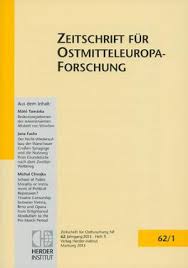„Jüdische Freiheit“ oder: Integration und Autonomie in Polen im 15. und 16. Jahrhundert
"Jewish Freedom " or: Integration and autonomy in Poland in the 15' and 16' centuries
Author(s): Jürgen HeydeSubject(s): Jewish studies, Political history, Social history, 15th Century, 16th Century
Published by: Verlag Herder-Institut
Keywords: Jewish Freedom; Integration and autonomy; Poland; 15' and 16' centuries;
Summary/Abstract: Referring to a quotation by R. Hayyim ben Betsalel Friedberg - according to which the Jews in Poland, unlike in the German countries, were not being offended or persecuted, but, on the contrary, all Christians were impressed when entering a Jewish street, not daring to do a Jew any harm - this article attempts to apply the term "freedom" ("libertas") to the Polish-Lithuanian Jewry in its pre-modern sense, meaning freedom from oppression and the possibility to participate in society. This goes far beyond the term "tolerance", since it considers the Jews active participants rather than passive recipients in political and social developments. First, this article examines the legal basis of Jewish life in the kingdom of Poland, especially their ties to the royal Chamber, which were not tantamount to the western European concept of "Kammerknechtschaff'. In its second part, the article takes a look at the relations between the king and the Jewish economic elites in the 15th Century, and the ways the Jewish Community elites and rabbis established contacts to the non-Jewish elites in the 16* Century. Whereas, up to the end of the Middle Ages, the Polish kings had almost exclusively held contacts to the Jewish economic elites, in the 16' Century they also integrated other leading groups of the Jewish population, i.e. the Community leadership and the rabbis, into their policy. This policy was most successful where the king made use of his authonty as a kind of arbitrator, in a similar way as he used to be towards the nobility. Thus, the king became an attractive contact person for the Jewish elites, who, vice versa, strengthened his authonty within the Jewish population. Through the mutual recognition of their respective interests and the search for workable compromises, the Jewish autonomy in Poland Consolidated, making the Jewish population an essential element of the social System in early modern times.
Journal: Zeitschrift für Ostmitteleuropa-Forschung
- Issue Year: 57/2008
- Issue No: 1
- Page Range: 34-51
- Page Count: 18
- Language: German

